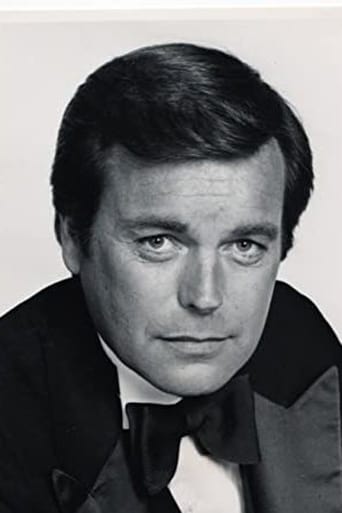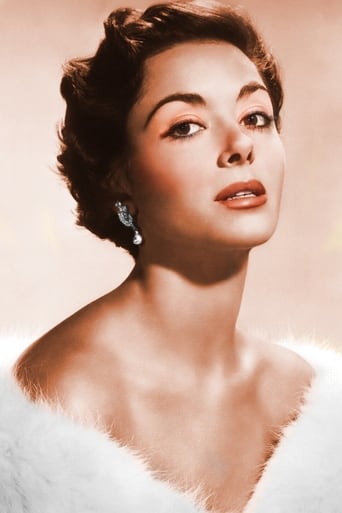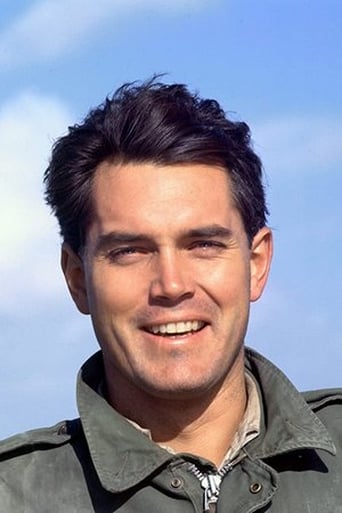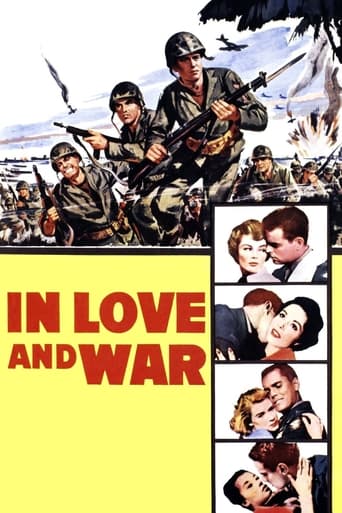
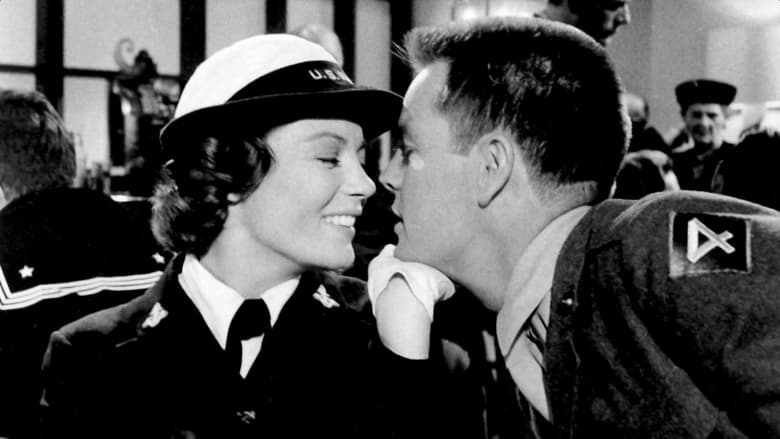
In Love and War (1958)
Three Marines take shore leave in San Francisco during World War II. Frankie O'Neill visits his lower-class dysfunctional family; Nico Kantaylis visits his pregnant fiancée; and the upper-class Alan Newcombe visits his high-living playgirl girlfriend. Each must decide whether to make the best of his situation or break out of it. O'Neill drowns his troubles in alcohol, losing the respect of a potential lover; Kantaylis marries his fiancée, but realizes he may not survive the war to see his child; while Newcombe sheds his decadent girlfriend for a pure-hearted Hawaiian nurse. Later, in battle, a heroic act costs one of the Marines his life.
Watch Trailer
Cast
Reviews
Boring
Fanciful, disturbing, and wildly original, it announces the arrival of a fresh, bold voice in American cinema.
It is a whirlwind of delight --- attractive actors, stunning couture, spectacular sets and outrageous parties.
It's easily one of the freshest, sharpest and most enjoyable films of this year.
Wonderful acting by a superb cast, especially Robert Wagner, in a real breakout performance, as a Marine who comes home on leave to face a demeaning stepfather, abusive to both him, his younger brother and sister and his mother. He never lets her forget what her first husband was like while he totally demeans his eldest stepson.Jeffrey Hunter was also quite good as a guy coming home to wed his got in trouble girlfriend, Hope Lange, in one of her best performances as well to almost rival "Peyton Place." She begs him not to return to conflict in the same manner as Donna Reid pleaded with Montgomery Clift in "From Here to Eternity."Bradford Dillman is the third marine, from a wealthy family, whose father wanted to use his connections to get Dillman out of combat. Dillman must also contend with his fiancé, a very troubled, heavy drinking Dana Wynter, in also one of her finest performances. France Nuyen is the girl he ultimately falls for after a chance meeting in a hotel.The picture is ripe with prejudice, anti-war sentiment and all sorts of social ills brought out very well by this ensemble cast.
Anton Myrer was a very good writer, smooth, palatable. But I'm not sure about Edwar Anhalt's commercially oriented adaptation. Three Marines visit their San Francisco homes in 1944 and face the kinds of familial and romantic problems that were found in "Payton Place" and so many other stories of the 1940s and 50s. Everything is spelled out at once, as in a brief television advertisement. Jeffrey Hunter is an experienced gunnery sergeant. His Greek family loves him but his problem is that his girl friend, Hope Lange, is now preggers. I particularly like Hope Lange. She was pretty in a wholesome, wistful way. I may have patronized her family's restaurant in Greenwich Village in the 50s and she was my costar in David Lynch's "Blue Velvet." Robert Wagner is the cocky young Irish enlistee from the slums, also my costar in the unforgettable mini series whose title I've forgotten. (You ought to see what San Francisco considers a slum; in my neighborhood that would have been in the middle range of the middle class.) His problem is that he drinks too much and his step father constantly insults him. Then there's Bradford Dillman, a native San Franciscan actually, who is the well-educated rich kid engaged to the willful drunk, the self-described "rich tramp", Dana Wynters. He's also got a thing going with the very attractive France Nuyen but that's headed nowhere, this being the 1940 and Nuyen being a person of color, even though it's a very attractive color. I sobbed like a child through all this exposition.Next, the three men wind up in the same hotel. Hunter takes his new wife to the honeymoon suite and as the lights go out and they embrace, she whispers, "This is the first time. The baby came from the first time." (I'd always thought you were entitled to only one first time.) Meanwhile Robert Wagner is courting his old girl friend, Sheree North, who has become a WAVE in his absence. A third-class yeoman, she outranks him but this doesn't bother either of them. Wagner gets loud and drunk, as expected, and when he starts a fight or passes out we're expected to be amused. In Hawaii, Dillman also gets a thing going with the very attractive France Nuyen but that's headed nowhere, this being the 1940s and Nuyen being a person of color, even though it's a very attractive color. Dillman, by the way, is an interesting actor: prep school, Yale, the Marine Corps. And when he speaks, the intonations conjure up the ghost of Charlton Heston. The men remain as before: one grown-up Greek; one boisterous Irish drunk; one polite but confused aristocrat. All of this trite exploration of characters and their conundrums, accompanied by a lush, fulsome romantic theme, takes up the entire first half of the movie. They all argue passionately about one thing or another, until the viewer gets the impression that the battlefield might be a relief. All the girls yield. All the men score. And, yes, I was racked by tears throughout.Finally the men depart for landings in the Pacific. "God. Damn war," says France Nuyen as they sail. "God" and "damn" are two separate words. I don't think "God damned" was quite acceptable at the time. As the landing craft approach the erupting beach of an unnamed island, we meet Mort Sahl, a now mostly forgotten comic of the 50s, who at least introduces some necessary humor. Reading from one of those "Know Your Enemy" books, he announces, "Remember, if you are captured give them nothing but your name, rank, and the exact position of your unit. What would they want with your serial number?" There follows some combat footage and some reasonably well-done enactments. The cocky Irish kid is humbled by a fit of cowardice. Dillman breaks down with dengue fever. Hunter is already suffering from malaria.But enough about the Marines and their tsuris. The film, as if undergoing withdrawal, twitches and flips in spasmodic fits back to pointless scenes of the girls in San Francisco. You will not be surprised that Hunter's wife, Hope Lange, meets her husband's Greek family for the first time, and she and the baby are greeted with ebullience. Nor will you be surprised to learn that Dana Wynter, the "rich tramp," has slit her wrists and wound up in the hospital where she is treated by -- get this -- France Nuyen, her ex boyfriend's new girl friend, who happens to be a nurse. Dana Wynter wakes up in a state of anguish and full make up and begins babbling to Nuyen, who is a complete stranger to her. "I didn't mean to do it. I need HELP!" She expires with a piercing shriek. Nuyen is compelled to look away sadly, but surely she, a grown woman, must realize that with the departure of Wynter, there is no one else left for Dillman, the very wealthy aristocrat, to come home to. She wastes no time before visiting Dillman's rich family, the family with the butler. By this time the tears had stopped and I was dissolved in laughter.The battle is well-done and the final scenes of the returning men are moving, but what can redeem that soap opera? Dynasties rose and fell, geological epochs came and went, while we watched young men and women wrestle with emotional problems so familiar and predictable that they might have come directly from Screen writing For Dummies. I'm sure that Myrer's novel was better.
The story follows three marines, and their girls, from home leave to combat in the Pacific.The movie's very much a mixed package. With a couple exceptions, war films of the 1950's shied away from combat realism, whose trauma might easily overwhelm audiences. The second half of this war film does a pretty good job portraying the so-called fog of war, along with perfectly natural emotional and physical reactions to combat death. These scenes are done on exterior sets and are uglified to maximal extent. Such grim scenes are then intercut with sunny scenes in San Francisco, done in glowing candy box colors. The resulting contrast is appropriately jolting, to say the least, and leaves no doubt that between "love" and "war", which is to be preferred.The trouble lies with a swollen narrative that is too conventional in the "Love" part. It also shows what happens when a big studio, TCF, decides to promote a younger cast into possible stardom. Everybody—about the top seven in the cast list—gets cameo screen time, in the film's first half, especially. This draws out the runtime, and coupled with a conventional script, tends to drag out the first part, long after we've gotten the idea. The actors perform well enough, though O'Neill's (Wagner) drunken binge is over the top, maybe the only time in the actor's generally restrained career. Note, in passing, the post-war symbolism of pairing Newcombe (Dillman) with Kalai (Nuyen).All in all, the movie's a good look at how Hollywood shaped WWII to commercial needs of the big screen. But is otherwise forgettable.
I grew up during the years of WWII and always enjoy movies made about that time. This movie is exceptionally great. TCM (Turner Classic Movies) shows it now and then. I like the choice of actors/actresses for the parts. Robert Wagner, Bradford Dillman, Jeffrey Hunter and Hope Lang are especially great. I like the scenes of early San Francisco shown in the film. I also think it's a great character study, most of the men in the U.S. felt it was their duty to enlist in the military to avenge our country. The struggle is show in the character of Alan Newcome (Bradford Dillman). And also the expectations put on Alan by his father. Then there is the internal struggle of "Frankie" (Robert Wagner) to measure up to the character of the men he is serving with. Then comes the noble gesture by Jeffrey Hunter's character to "do the right thing," and marry his pregnant girlfriend. I can't seem to find the right words to talk about this great movie, it's so exceptional. See it yourself, I think you'll like the life lessons it has.
